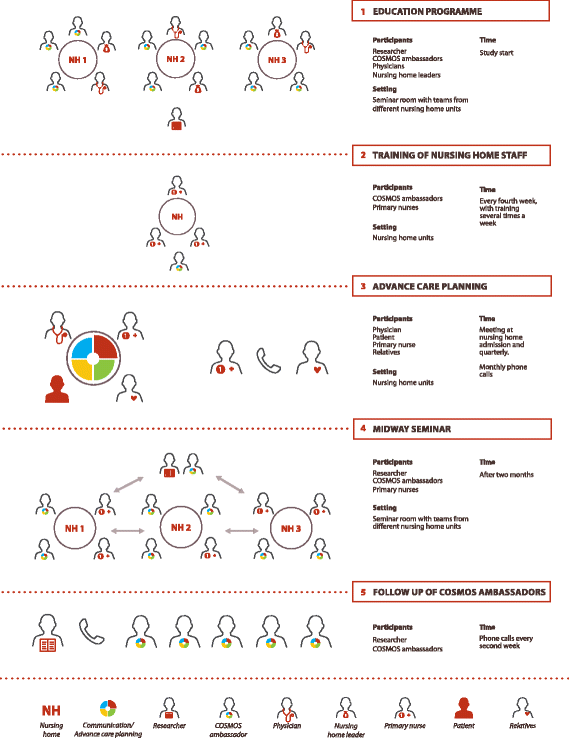Description of an advance care planning intervention in nursing homes: outcomes of the process evaluation
- PMID: 29370766
- PMCID: PMC5785831
- DOI: 10.1186/s12877-018-0713-7
Description of an advance care planning intervention in nursing homes: outcomes of the process evaluation
Abstract
Background: Advance Care Planning (ACP) is the repeated communication and decision-making process between the patient, family, and healthcare professionals. This study describes an ACP intervention in nursing homes and evaluates the outcomes of the implementation process.
Methods: The ACP intervention was part of a 4-month complex, cluster randomized controlled trial (COSMOS). 37 Norwegian nursing homes with 72 units (1 cluster = 1 unit) and 765 patients were invited to participate and eligible units were randomised to the intervention group or control. Nursing home staff in the intervention group was offered a standardized education programme to learn early and repeated communication with patients and families and to implement ACP in their units. We used a train-the-trainer approach to educate staff in the units, supported by regular telephone calls and a midway seminar after two months. Individual patient logs consisting of different communication deliverables were used to evaluate the implementation process. Supported by Qualitative Content Analyses, we identified facilitators and barriers of the ACP implementation based on feedback during midway seminars and individual patient logs.
Results: The ACP intervention was conducted in 36 NH units (n = 297); 105 healthcare providers participated at the education seminar prior to the study, and 3-4 employees from each unit participated in the midway seminar. NH staff reported the educational material relevant for the implementation strategy. The patient logs showed that ACP was successfully implemented in 62% (n = 183) of the patients using our predefined implementation criteria. The staff emphasized the clear communication of the relevance of ACP addressed to leaders and staff as important facilitators, along with the clearly defined routines, roles and responsibilities. Identified barriers included lack of competence, perceived lack of time, and conflicting culture and staff opinions.
Conclusion: Monthly communication with the family was the most frequently conducted communication, and the predefined criteria of successfully implemented ACP were largely achieved. Nursing home routines and engagement of leaders and staff were crucial facilitators, whereas lack of time and competence reduced the implementation success.
Trial registration: The COSMOS-trial was registered in the ClinicalTrials.gov ( NCT02238652 ) July 7th, 2014.
Keywords: Advance care planning; Education; Implementation; Nursing home; Staff training; Train-the-trainer.
Conflict of interest statement
Ethics approval and consent to participate
The Regional Ethical Committee for Medicine and Health Research Ethics, West Norway approved the study prior to initiation (2013/1765). The study is registered in clinicaltrial.gov (NCT02238652). Patients and their next of kin received both written and verbal information about the study. Written informed consent was obtained from all patients with mental capability to understand the implications of the study. The assessment of capability was done by trained researchers and the patients’ health care providers. In patients lacking the ability to consent, written presumed consent was obtained from his or her legal guardian.
Consent for publication
Not applicable
Competing interests
The authors declare that they have no competing interests.
Publisher’s Note
Springer Nature remains neutral with regard to jurisdictional claims in published maps and institutional affiliations.
Figures

References
-
- Reyniers T, Deliens L, Pasman HR, Morin L, Addington-Hall J, Frova L, Cardenas-Turanzas M, Onwuteaka-Philipsen B, Naylor W, Ruiz-Ramos M, et al. International variation in place of death of older people who died from dementia in 14 European and non-European countries. J Am Med Dir Assoc. 2015;16(2):165–171. doi: 10.1016/j.jamda.2014.11.003. - DOI - PubMed
-
- Pivodic L, Pardon K, Morin L, Addington-Hall J, Miccinesi G, Cardenas-Turanzas M, Onwuteaka-Philipsen B, Naylor W, Ruiz Ramos M, Van den Block L, et al. Place of death in the population dying from diseases indicative of palliative care need: a cross-national population-level study in 14 countries. J Epidemiol Community Health. 2016;70(1):17–24. doi: 10.1136/jech-2014-205365. - DOI - PubMed
-
- Kowalska J, Rymaszewska J, Szczepanska-Gieracha J. Occurrence of cognitive impairment and depressive symptoms among the elderly in a nursing home facility. Adv Clin Exp Med. 2013;22(1):111–117. - PubMed
Publication types
MeSH terms
Associated data
Grants and funding
LinkOut - more resources
Full Text Sources
Other Literature Sources
Medical

